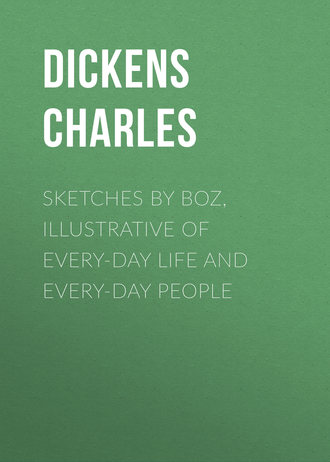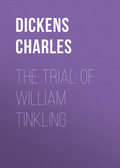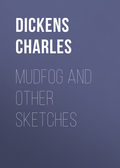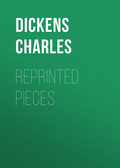
Чарльз Диккенс
Sketches by Boz, Illustrative of Every-Day Life and Every-Day People
‘Half-past ten.
‘The disturbance, I am happy to inform you, has been completely quelled, and the ringleader taken into custody. She had a pail of cold water thrown over her, previous to being locked up, and expresses great contrition and uneasiness. We are all in a fever of anticipation about to-morrow; but, now that we are within a few hours of the meeting of the association, and at last enjoy the proud consciousness of having its illustrious members amongst us, I trust and hope everything may go off peaceably. I shall send you a full report of to-morrow’s proceedings by the night coach.’
‘Eleven o’clock.
‘I open my letter to say that nothing whatever has occurred since I folded it up.’
‘Thursday.
‘The sun rose this morning at the usual hour. I did not observe anything particular in the aspect of the glorious planet, except that he appeared to me (it might have been a delusion of my heightened fancy) to shine with more than common brilliancy, and to shed a refulgent lustre upon the town, such as I had never observed before. This is the more extraordinary, as the sky was perfectly cloudless, and the atmosphere peculiarly fine. At half-past nine o’clock the general committee assembled, with the last year’s president in the chair. The report of the council was read; and one passage, which stated that the council had corresponded with no less than three thousand five hundred and seventy-one persons, (all of whom paid their own postage,) on no fewer than seven thousand two hundred and forty-three topics, was received with a degree of enthusiasm which no efforts could suppress. The various committees and sections having been appointed, and the more formal business transacted, the great proceedings of the meeting commenced at eleven o’clock precisely. I had the happiness of occupying a most eligible position at that time, in
‘SECTION A. – ZOOLOGY AND BOTANY.
GREAT ROOM, PIG AND TINDER-BOX.
President– Professor Snore. Vice-Presidents– Professors Doze and Wheezy.
‘The scene at this moment was particularly striking. The sun streamed through the windows of the apartments, and tinted the whole scene with its brilliant rays, bringing out in strong relief the noble visages of the professors and scientific gentlemen, who, some with bald heads, some with red heads, some with brown heads, some with grey heads, some with black heads, some with block heads, presented a coup d’oeil which no eye-witness will readily forget. In front of these gentlemen were papers and inkstands; and round the room, on elevated benches extending as far as the forms could reach, were assembled a brilliant concourse of those lovely and elegant women for which Mudfog is justly acknowledged to be without a rival in the whole world. The contrast between their fair faces and the dark coats and trousers of the scientific gentlemen I shall never cease to remember while Memory holds her seat.
‘Time having been allowed for a slight confusion, occasioned by the falling down of the greater part of the platforms, to subside, the president called on one of the secretaries to read a communication entitled, “Some remarks on the industrious fleas, with considerations on the importance of establishing infant-schools among that numerous class of society; of directing their industry to useful and practical ends; and of applying the surplus fruits thereof, towards providing for them a comfortable and respectable maintenance in their old age.”
‘The author stated, that, having long turned his attention to the moral and social condition of these interesting animals, he had been induced to visit an exhibition in Regent-street, London, commonly known by the designation of “The Industrious Fleas.” He had there seen many fleas, occupied certainly in various pursuits and avocations, but occupied, he was bound to add, in a manner which no man of well-regulated mind could fail to regard with sorrow and regret. One flea, reduced to the level of a beast of burden, was drawing about a miniature gig, containing a particularly small effigy of His Grace the Duke of Wellington; while another was staggering beneath the weight of a golden model of his great adversary Napoleon Bonaparte. Some, brought up as mountebanks and ballet-dancers, were performing a figure-dance (he regretted to observe, that, of the fleas so employed, several were females); others were in training, in a small card-board box, for pedestrians, – mere sporting characters – and two were actually engaged in the cold-blooded and barbarous occupation of duelling; a pursuit from which humanity recoiled with horror and disgust. He suggested that measures should be immediately taken to employ the labour of these fleas as part and parcel of the productive power of the country, which might easily be done by the establishment among them of infant schools and houses of industry, in which a system of virtuous education, based upon sound principles, should be observed, and moral precepts strictly inculcated. He proposed that every flea who presumed to exhibit, for hire, music, or dancing, or any species of theatrical entertainment, without a licence, should be considered a vagabond, and treated accordingly; in which respect he only placed him upon a level with the rest of mankind. He would further suggest that their labour should be placed under the control and regulation of the state, who should set apart from the profits, a fund for the support of superannuated or disabled fleas, their widows and orphans. With this view, he proposed that liberal premiums should be offered for the three best designs for a general almshouse; from which – as insect architecture was well known to be in a very advanced and perfect state – we might possibly derive many valuable hints for the improvement of our metropolitan universities, national galleries, and other public edifices.
‘The President wished to be informed how the ingenious gentleman proposed to open a communication with fleas generally, in the first instance, so that they might be thoroughly imbued with a sense of the advantages they must necessarily derive from changing their mode of life, and applying themselves to honest labour. This appeared to him, the only difficulty.
‘The Author submitted that this difficulty was easily overcome, or rather that there was no difficulty at all in the case. Obviously the course to be pursued, if Her Majesty’s government could be prevailed upon to take up the plan, would be, to secure at a remunerative salary the individual to whom he had alluded as presiding over the exhibition in Regent-street at the period of his visit. That gentleman would at once be able to put himself in communication with the mass of the fleas, and to instruct them in pursuance of some general plan of education, to be sanctioned by Parliament, until such time as the more intelligent among them were advanced enough to officiate as teachers to the rest.
‘The President and several members of the section highly complimented the author of the paper last read, on his most ingenious and important treatise. It was determined that the subject should be recommended to the immediate consideration of the council.
‘Mr. Wigsby produced a cauliflower somewhat larger than a chaise-umbrella, which had been raised by no other artificial means than the simple application of highly carbonated soda-water as manure. He explained that by scooping out the head, which would afford a new and delicious species of nourishment for the poor, a parachute, in principle something similar to that constructed by M. Garnerin, was at once obtained; the stalk of course being kept downwards. He added that he was perfectly willing to make a descent from a height of not less than three miles and a quarter; and had in fact already proposed the same to the proprietors of Vauxhall Gardens, who in the handsomest manner at once consented to his wishes, and appointed an early day next summer for the undertaking; merely stipulating that the rim of the cauliflower should be previously broken in three or four places to ensure the safety of the descent.
‘The President congratulated the public on the grand gala in store for them, and warmly eulogised the proprietors of the establishment alluded to, for their love of science, and regard for the safety of human life, both of which did them the highest honour.
‘A Member wished to know how many thousand additional lamps the royal property would be illuminated with, on the night after the descent.
‘Mr. Wigsby replied that the point was not yet finally decided; but he believed it was proposed, over and above the ordinary illuminations, to exhibit in various devices eight millions and a-half of additional lamps.
‘The Member expressed himself much gratified with this announcement.
‘Mr. Blunderum delighted the section with a most interesting and valuable paper “on the last moments of the learned pig,” which produced a very strong impression on the assembly, the account being compiled from the personal recollections of his favourite attendant. The account stated in the most emphatic terms that the animal’s name was not Toby, but Solomon; and distinctly proved that he could have no near relatives in the profession, as many designing persons had falsely stated, inasmuch as his father, mother, brothers and sisters, had all fallen victims to the butcher at different times. An uncle of his indeed, had with very great labour been traced to a sty in Somers Town; but as he was in a very infirm state at the time, being afflicted with measles, and shortly afterwards disappeared, there appeared too much reason to conjecture that he had been converted into sausages. The disorder of the learned pig was originally a severe cold, which, being aggravated by excessive trough indulgence, finally settled upon the lungs, and terminated in a general decay of the constitution. A melancholy instance of a presentiment entertained by the animal of his approaching dissolution, was recorded. After gratifying a numerous and fashionable company with his performances, in which no falling off whatever was visible, he fixed his eyes on the biographer, and, turning to the watch which lay on the floor, and on which he was accustomed to point out the hour, deliberately passed his snout twice round the dial. In precisely four-and-twenty hours from that time he had ceased to exist!
‘Professor Wheezy inquired whether, previous to his demise, the animal had expressed, by signs or otherwise, any wishes regarding the disposal of his little property.
‘Mr. Blunderum replied, that, when the biographer took up the pack of cards at the conclusion of the performance, the animal grunted several times in a significant manner, and nodding his head as he was accustomed to do, when gratified. From these gestures it was understood that he wished the attendant to keep the cards, which he had ever since done. He had not expressed any wish relative to his watch, which had accordingly been pawned by the same individual.
‘The President wished to know whether any Member of the section had ever seen or conversed with the pig-faced lady, who was reported to have worn a black velvet mask, and to have taken her meals from a golden trough.
‘After some hesitation a Member replied that the pig-faced lady was his mother-in-law, and that he trusted the President would not violate the sanctity of private life.
‘The President begged pardon. He had considered the pig-faced lady a public character. Would the honourable member object to state, with a view to the advancement of science, whether she was in any way connected with the learned pig?
‘The Member replied in the same low tone, that, as the question appeared to involve a suspicion that the learned pig might be his half-brother, he must decline answering it.
‘SECTION B. – ANATOMY AND MEDICINE.
COACH-HOUSE, PIG AND TINDER-BOX.
President– Dr. Toorell. Vice-Presidents– Professors Muff and Nogo.
Dr. Kutankumagen (of Moscow) read to the section a report of a case which had occurred within his own practice, strikingly illustrative of the power of medicine, as exemplified in his successful treatment of a virulent disorder. He had been called in to visit the patient on the 1st of April, 1837. He was then labouring under symptoms peculiarly alarming to any medical man. His frame was stout and muscular, his step firm and elastic, his cheeks plump and red, his voice loud, his appetite good, his pulse full and round. He was in the constant habit of eating three meals per diem, and of drinking at least one bottle of wine, and one glass of spirituous liquors diluted with water, in the course of the four-and-twenty hours. He laughed constantly, and in so hearty a manner that it was terrible to hear him. By dint of powerful medicine, low diet, and bleeding, the symptoms in the course of three days perceptibly decreased. A rigid perseverance in the same course of treatment for only one week, accompanied with small doses of water-gruel, weak broth, and barley-water, led to their entire disappearance. In the course of a month he was sufficiently recovered to be carried down-stairs by two nurses, and to enjoy an airing in a close carriage, supported by soft pillows. At the present moment he was restored so far as to walk about, with the slight assistance of a crutch and a boy. It would perhaps be gratifying to the section to learn that he ate little, drank little, slept little, and was never heard to laugh by any accident whatever.
‘Dr. W. R. Fee, in complimenting the honourable member upon the triumphant cure he had effected, begged to ask whether the patient still bled freely?
‘Dr. Kutankumagen replied in the affirmative.
‘Dr. W. R. Fee. – And you found that he bled freely during the whole course of the disorder?
‘Dr. Kutankumagen. – Oh dear, yes; most freely.
‘Dr. Neeshawts supposed, that if the patient had not submitted to be bled with great readiness and perseverance, so extraordinary a cure could never, in fact, have been accomplished. Dr. Kutankumagen rejoined, certainly not.
‘Mr. Knight Bell (M.R.C.S.) exhibited a wax preparation of the interior of a gentleman who in early life had inadvertently swallowed a door-key. It was a curious fact that a medical student of dissipated habits, being present at the post mortem examination, found means to escape unobserved from the room, with that portion of the coats of the stomach upon which an exact model of the instrument was distinctly impressed, with which he hastened to a locksmith of doubtful character, who made a new key from the pattern so shown to him. With this key the medical student entered the house of the deceased gentleman, and committed a burglary to a large amount, for which he was subsequently tried and executed.
‘The President wished to know what became of the original key after the lapse of years. Mr. Knight Bell replied that the gentleman was always much accustomed to punch, and it was supposed the acid had gradually devoured it.
‘Dr. Neeshawts and several of the members were of opinion that the key must have lain very cold and heavy upon the gentleman’s stomach.
‘Mr. Knight Bell believed it did at first. It was worthy of remark, perhaps, that for some years the gentleman was troubled with a night-mare, under the influence of which he always imagined himself a wine-cellar door.
‘Professor Muff related a very extraordinary and convincing proof of the wonderful efficacy of the system of infinitesimal doses, which the section were doubtless aware was based upon the theory that the very minutest amount of any given drug, properly dispersed through the human frame, would be productive of precisely the same result as a very large dose administered in the usual manner. Thus, the fortieth part of a grain of calomel was supposed to be equal to a five-grain calomel pill, and so on in proportion throughout the whole range of medicine. He had tried the experiment in a curious manner upon a publican who had been brought into the hospital with a broken head, and was cured upon the infinitesimal system in the incredibly short space of three months. This man was a hard drinker. He (Professor Muff) had dispersed three drops of rum through a bucket of water, and requested the man to drink the whole. What was the result? Before he had drunk a quart, he was in a state of beastly intoxication; and five other men were made dead drunk with the remainder.
‘The President wished to know whether an infinitesimal dose of soda-water would have recovered them? Professor Muff replied that the twenty-fifth part of a teaspoonful, properly administered to each patient, would have sobered him immediately. The President remarked that this was a most important discovery, and he hoped the Lord Mayor and Court of Aldermen would patronize it immediately.
‘A Member begged to be informed whether it would be possible to administer – say, the twentieth part of a grain of bread and cheese to all grown-up paupers, and the fortieth part to children, with the same satisfying effect as their present allowance.
‘Professor Muff was willing to stake his professional reputation on the perfect adequacy of such a quantity of food to the support of human life – in workhouses; the addition of the fifteenth part of a grain of pudding twice a week would render it a high diet.
‘Professor Nogo called the attention of the section to a very extraordinary case of animal magnetism. A private watchman, being merely looked at by the operator from the opposite side of a wide street, was at once observed to be in a very drowsy and languid state. He was followed to his box, and being once slightly rubbed on the palms of the hands, fell into a sound sleep, in which he continued without intermission for ten hours.
‘SECTION C. – STATISTICS.
HAY-LOFT, ORIGINAL PIG.
President– Mr. Woodensconce. Vice-Presidents– Mr. Ledbrain and Mr. Timbered.
‘Mr. Slug stated to the section the result of some calculations he had made with great difficulty and labour, regarding the state of infant education among the middle classes of London. He found that, within a circle of three miles from the Elephant and Castle, the following were the names and numbers of children’s books principally in circulation: —

‘He found that the proportion of Robinson Crusoes to Philip Quarlls was as four and a half to one; and that the preponderance of Valentine and Orsons over Goody Two Shoeses was as three and an eighth of the former to half a one of the latter; a comparison of Seven Champions with Simple Simons gave the same result. The ignorance that prevailed, was lamentable. One child, on being asked whether he would rather be Saint George of England or a respectable tallow-chandler, instantly replied, “Taint George of Ingling.” Another, a little boy of eight years old, was found to be firmly impressed with a belief in the existence of dragons, and openly stated that it was his intention when he grew up, to rush forth sword in hand for the deliverance of captive princesses, and the promiscuous slaughter of giants. Not one child among the number interrogated had ever heard of Mungo Park, – some inquiring whether he was at all connected with the black man that swept the crossing; and others whether he was in any way related to the Regent’s Park. They had not the slightest conception of the commonest principles of mathematics, and considered Sindbad the Sailor the most enterprising voyager that the world had ever produced.
‘A Member strongly deprecating the use of all the other books mentioned, suggested that Jack and Jill might perhaps be exempted from the general censure, inasmuch as the hero and heroine, in the very outset of the tale, were depicted as going up a hill to fetch a pail of water, which was a laborious and useful occupation, – supposing the family linen was being washed, for instance.
‘Mr. Slug feared that the moral effect of this passage was more than counterbalanced by another in a subsequent part of the poem, in which very gross allusion was made to the mode in which the heroine was personally chastised by her mother
“‘For laughing at Jack’s disaster;”
besides, the whole work had this one great fault, it was not true.
‘The President complimented the honourable member on the excellent distinction he had drawn. Several other Members, too, dwelt upon the immense and urgent necessity of storing the minds of children with nothing but facts and figures; which process the President very forcibly remarked, had made them (the section) the men they were.
‘Mr. Slug then stated some curious calculations respecting the dogs’-meat barrows of London. He found that the total number of small carts and barrows engaged in dispensing provision to the cats and dogs of the metropolis was, one thousand seven hundred and forty-three. The average number of skewers delivered daily with the provender, by each dogs’-meat cart or barrow, was thirty-six. Now, multiplying the number of skewers so delivered by the number of barrows, a total of sixty-two thousand seven hundred and forty-eight skewers daily would be obtained. Allowing that, of these sixty-two thousand seven hundred and forty-eight skewers, the odd two thousand seven hundred and forty-eight were accidentally devoured with the meat, by the most voracious of the animals supplied, it followed that sixty thousand skewers per day, or the enormous number of twenty-one millions nine hundred thousand skewers annually, were wasted in the kennels and dustholes of London; which, if collected and warehoused, would in ten years’ time afford a mass of timber more than sufficient for the construction of a first-rate vessel of war for the use of her Majesty’s navy, to be called “The Royal Skewer,” and to become under that name the terror of all the enemies of this island.
‘Mr. X. Ledbrain read a very ingenious communication, from which it appeared that the total number of legs belonging to the manufacturing population of one great town in Yorkshire was, in round numbers, forty thousand, while the total number of chair and stool legs in their houses was only thirty thousand, which, upon the very favourable average of three legs to a seat, yielded only ten thousand seats in all. From this calculation it would appear, – not taking wooden or cork legs into the account, but allowing two legs to every person, – that ten thousand individuals (one-half of the whole population) were either destitute of any rest for their legs at all, or passed the whole of their leisure time in sitting upon boxes.
‘SECTION D. – MECHANICAL SCIENCE.
COACH-HOUSE, ORIGINAL PIG.
President– Mr. Carter. Vice-Presidents– Mr. Truck and Mr. Waghorn.
‘Professor Queerspeck exhibited an elegant model of a portable railway, neatly mounted in a green case, for the waistcoat pocket. By attaching this beautiful instrument to his boots, any Bank or public-office clerk could transport himself from his place of residence to his place of business, at the easy rate of sixty-five miles an hour, which, to gentlemen of sedentary pursuits, would be an incalculable advantage.
‘The President was desirous of knowing whether it was necessary to have a level surface on which the gentleman was to run.
‘Professor Queerspeck explained that City gentlemen would run in trains, being handcuffed together to prevent confusion or unpleasantness. For instance, trains would start every morning at eight, nine, and ten o’clock, from Camden Town, Islington, Camberwell, Hackney, and various other places in which City gentlemen are accustomed to reside. It would be necessary to have a level, but he had provided for this difficulty by proposing that the best line that the circumstances would admit of, should be taken through the sewers which undermine the streets of the metropolis, and which, well lighted by jets from the gas pipes which run immediately above them, would form a pleasant and commodious arcade, especially in winter-time, when the inconvenient custom of carrying umbrellas, now so general, could be wholly dispensed with. In reply to another question, Professor Queerspeck stated that no substitute for the purposes to which these arcades were at present devoted had yet occurred to him, but that he hoped no fanciful objection on this head would be allowed to interfere with so great an undertaking.
‘Mr. Jobba produced a forcing-machine on a novel plan, for bringing joint-stock railway shares prematurely to a premium. The instrument was in the form of an elegant gilt weather-glass, of most dazzling appearance, and was worked behind, by strings, after the manner of a pantomime trick, the strings being always pulled by the directors of the company to which the machine belonged. The quicksilver was so ingeniously placed, that when the acting directors held shares in their pockets, figures denoting very small expenses and very large returns appeared upon the glass; but the moment the directors parted with these pieces of paper, the estimate of needful expenditure suddenly increased itself to an immense extent, while the statements of certain profits became reduced in the same proportion. Mr. Jobba stated that the machine had been in constant requisition for some months past, and he had never once known it to fail.
‘A Member expressed his opinion that it was extremely neat and pretty. He wished to know whether it was not liable to accidental derangement? Mr. Jobba said that the whole machine was undoubtedly liable to be blown up, but that was the only objection to it.
‘Professor Nogo arrived from the anatomical section to exhibit a model of a safety fire-escape, which could be fixed at any time, in less than half an hour, and by means of which, the youngest or most infirm persons (successfully resisting the progress of the flames until it was quite ready) could be preserved if they merely balanced themselves for a few minutes on the sill of their bedroom window, and got into the escape without falling into the street. The Professor stated that the number of boys who had been rescued in the daytime by this machine from houses which were not on fire, was almost incredible. Not a conflagration had occurred in the whole of London for many months past to which the escape had not been carried on the very next day, and put in action before a concourse of persons.
‘The President inquired whether there was not some difficulty in ascertaining which was the top of the machine, and which the bottom, in cases of pressing emergency.
‘Professor Nogo explained that of course it could not be expected to act quite as well when there was a fire, as when there was not a fire; but in the former case he thought it would be of equal service whether the top were up or down.’
With the last section our correspondent concludes his most able and faithful Report, which will never cease to reflect credit upon him for his scientific attainments, and upon us for our enterprising spirit. It is needless to take a review of the subjects which have been discussed; of the mode in which they have been examined; of the great truths which they have elicited. They are now before the world, and we leave them to read, to consider, and to profit.
The place of meeting for next year has undergone discussion, and has at length been decided, regard being had to, and evidence being taken upon, the goodness of its wines, the supply of its markets, the hospitality of its inhabitants, and the quality of its hotels. We hope at this next meeting our correspondent may again be present, and that we may be once more the means of placing his communications before the world. Until that period we have been prevailed upon to allow this number of our Miscellany to be retailed to the public, or wholesaled to the trade, without any advance upon our usual price.
We have only to add, that the committees are now broken up, and that Mudfog is once again restored to its accustomed tranquillity, – that Professors and Members have had balls, and soirées, and suppers, and great mutual complimentations, and have at length dispersed to their several homes, – whither all good wishes and joys attend them, until next year!
Signed Boz.







